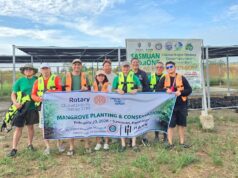ANGELES CITY – The overseas Filipino workers group Migrante International said yesterday that 10 Filipinos are facing the death penalty in the Middle East and are in need of government assistance.
John Leonard Monterona, Migrante-Middle East (Migrante-ME) said “there are about 10 OFWs languishing in various jails in the Middle East including six already meted the death penalty, and four who are awaiting probable death sentences for various criminal offenses.”
“We are renewing our call to the Philippine government to seriously find ways in raising amounts for the needed blood money to save them from execution and improve the legal assistance for them in various jails,” Monterona said.
He did not provide details on the 10 OFWs but apparently, his group had already provided the Department of Foreign Affairs (DFA) with information on them.
“If only there were jobs with decent pay and benefits in the Philippines, we won’t be forced to work abroad in a difficult and dangerous situation,” Monterona lamented.
This, even as Monterona said that an equivalent of about P17.5 million raised by US-Filipino philanthropist Loida Lewis, overseas Filipino contract workers in the Middle East, the Philippine government and other sympathizers will be turned over to a Saudi Arabian family by mid-March to save the life of OFW Dondon Lanuza who has been in jail in Dammam for 12 years now and is facing the death penalty there.
Monterona said he will be part of a group to be headed by Ambassador to Saudi Arabia Antonio Villamor set to meet with the family whose father, a Saudi Arabia national, was killed by Lanuza in 2000. Lanuza claimed self-defense.
The P17.5 million, however, would only be half of about P35 million “diyya” or blood money the family wants.
The funds raised so far include contributions from the “Barya Mo, Buhay Ko” launched by Lanuza’s family and supporters on the Facebook social network, as well as funds raised by Lewis from Filipino-Americans in the US.
In February 2010, the family of the aggrieved party issued an ‘affidavit of desistance’ with the Saudi Reconciliation Committee (SRC) headed by Sheik Ali, which conveyed forgiveness of Lanuza in exchange for the blood money as allowed by the Muslim Shariah Law.
Monterona said he had urged the government to designate Villamor to head the group to meet with the aggrieved family, as he noted that it was also Villamor who was instrumental in saving the life of OFW Sarah Dematera who had also faced the death penalty for the killing of her employer also in Saudi Arabia in 1992.
“I was informed by Ambassador Villamor that his team is working on the completion of formalities required relative to diplomatic protocol of the host government.
After that, they will proceed to Saudi Arabia for this purpose (of working out on the “diyya” process),” Monterona added.




